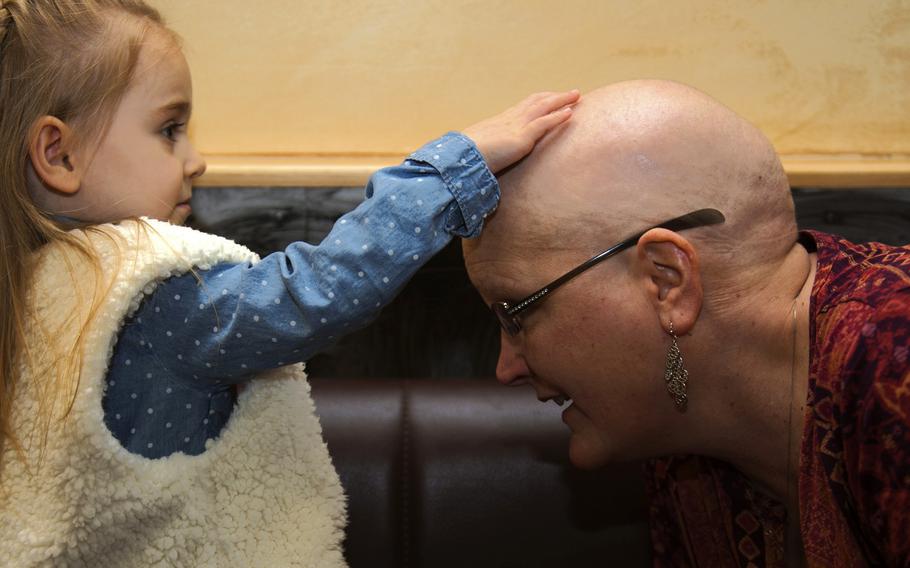
Theresa Lukens, right, breast cancer patient and wife of Chief Master Sgt. Richard Lukens, 52nd Maintenance Group chief enlisted manager, lets a friend’s daughter feel her head during lunch at Spangdahlem Air Base, Germany, Feb. 7, 2017. Lukens undergoes chemotherapy, a cancer treatment which can create a number of side effects to include fatigue, nausea, mouth and throat problems, skin and nail changes, easy bruising and bleeding, infection and hair loss. (Senior Airman Preston Cherry)
As a nation, we owe an immeasurable debt of gratitude to our veterans who have selflessly served and sacrificed to protect our freedoms. They have more than earned their right to the best possible health care. Yet, when it comes to addressing their health needs, particularly in the realm of cancer care, we often fall short. Sadly, cancer is the second leading cause of death worldwide, and it impacts veterans just like the rest of us. Around 56,000 veterans are diagnosed with cancer every year in the Department of Veterans Affairs system, and it’s well past time to provide them with the care and support they deserve. Thankfully, innovations in the private sector are revolutionizing cancer care and bringing VA centers into the 21st century. These advancements are not only enhancing and expediting treatment options, but also ensuring that veterans receive the highest quality care available. One notable example is the strategic partnership between the VA and Philips North America. Thanks to more than $4 million in federal funding, Philips has created digital tools that facilitate collaboration among the hundreds of cancer doctors and pathologists across VA sites. This technology improves diagnostic accuracy and efficiency, leveraging artificial intelligence to identify specific cancers while expediting the workflow of health care professionals. Without this technology, doctors rely on an outdated system where cancer cannot be properly diagnosed until a pathologist analyzes a biopsy and receives the consultation of another pathologist at a separate VA site. Treatment can only begin once two pathologists have exchanged correspondence and validated the disease. Some VA sites are hundreds of miles away from one another, meaning this process can take many days, if not weeks in some cases. As a veteran who has been on the receiving end of a cancer diagnosis due to toxic exposures while deployed, I know firsthand that every minute in the diagnosis and treatment process can make a difference. By allowing doctors to collaborate in real time and digitizing diagnostic images, digital pathology allows patients to commence cancer treatment sooner. It also enables more personalized treatment plans that can enhance overall patient outcomes. As promising as this private-public partnership is, only a handful of the VA sites in the country have adopted these digital pathology tools. That means the vast majority of hospitals serving veterans operate inefficiently and needlessly delay cancer treatment. The last thing a cancer patient needs is a bureaucratic process standing in the way of their treatment and recovery, and the worst part is, this is entirely avoidable. Our veterans deserve more support from federal lawmakers if we want to expand lifesaving technology nationwide. In today’s polarized times, few issues can unite members of Congress like improving care for veterans and modernizing the VA. It’s time our representatives stop simply paying lip service to this policy and actually pass legislation funding it. Improving cancer care for veterans is not merely a moral imperative; it’s a reflection of our nation’s commitment to honoring the sacrifices of those who have served. Our brave service members have risked their lives to defend our way of life, and the least we should do is give back with the best care in their time of need. By prioritizing the health and well-being of our veterans, we uphold the values they fought to protect and demonstrate our unwavering gratitude for their service. Congress must step up and champion advancements in technology to make that obligation possible. Gary Schell, a post-9/11 Marine Corps veteran from Arizona, is a PACT Act advocate and cancer survivor due to toxic exposures during combat deployments.